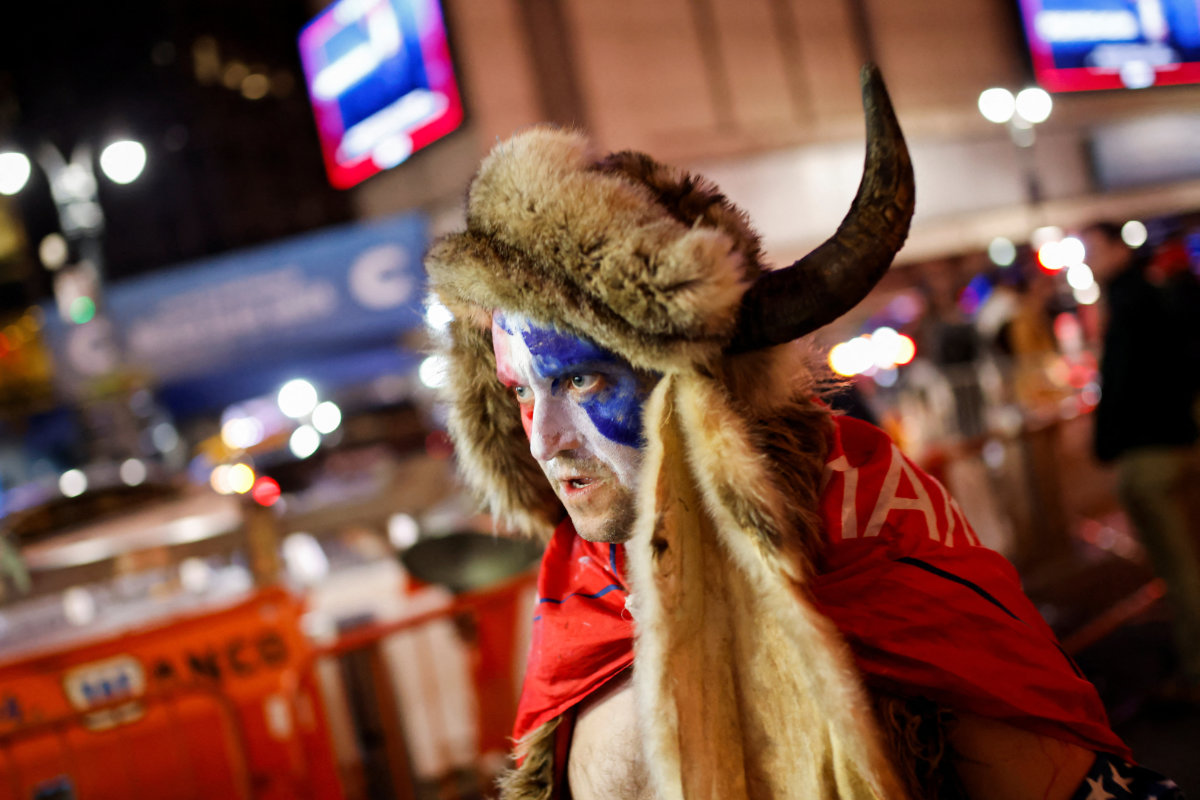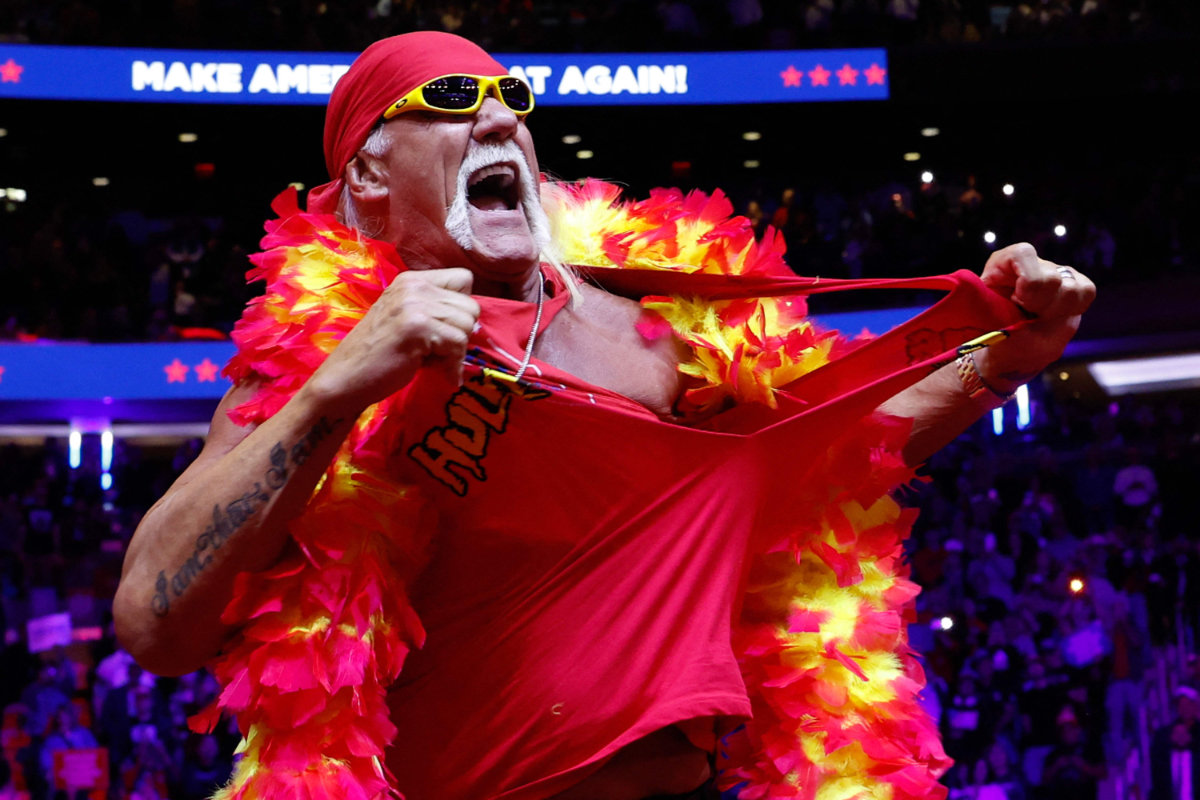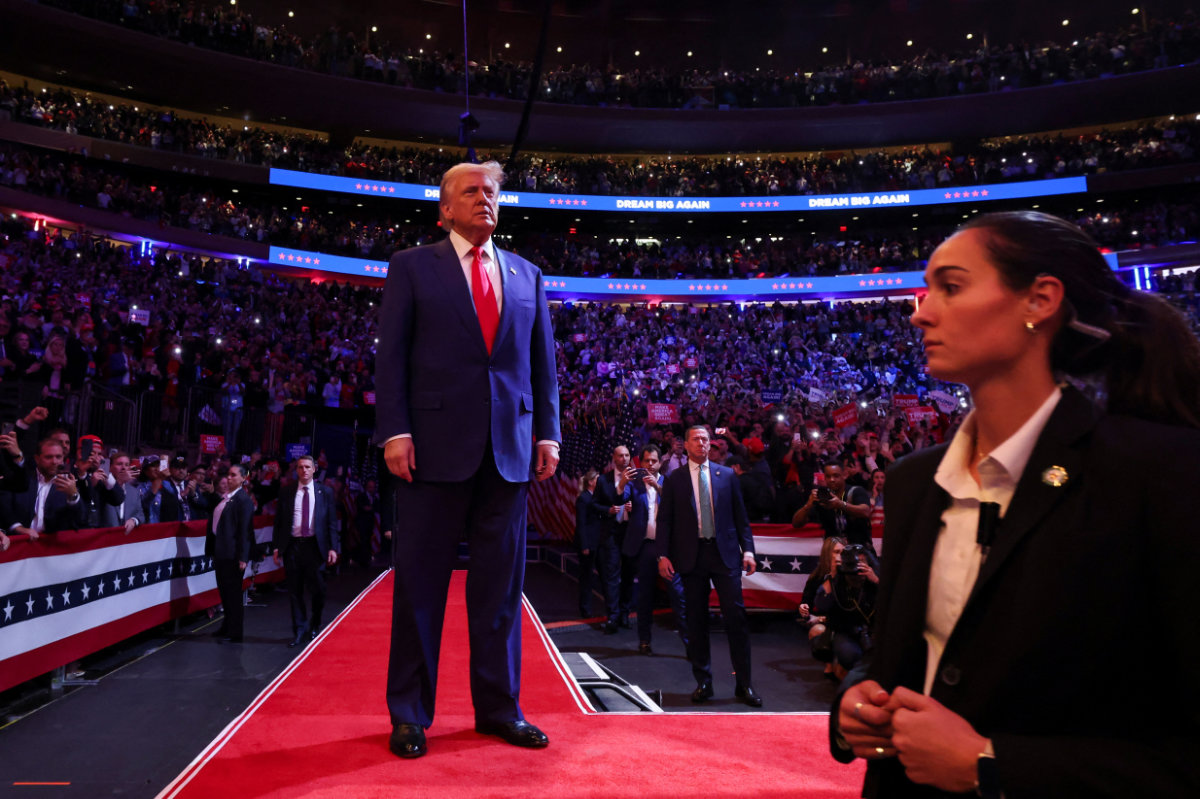NEW YORK: Donald Trump took the stage Sunday night at New York’s Madison Square Garden to deliver his campaign’s closing argument with the election nine days away after several of his allies used crude and racist insults toward Vice President Kamala Harris and other critics of the former president.
The Republican nominee began by asking the same questions he’s asked at the start of every recent rally: “Are you better off now than you were four years ago?” The crowd responded with a resounding “No!”
“This election is a choice between whether we’ll have four more years of gross incompetence and failure, or whether we’ll begin the greatest years in the history of our country,” he said after being introduced by his wife, Melania Trump, whose rare surprise appearance comes after she has been largely absent on the campaign trail.
Several speakers earlier on Sunday crudely insulted Harris, who is vying to become the first woman and Black woman to win the presidency. And a stand-up comedian made lewd and racist comments about Latinos, Jews and Black people, all key constituencies in the election just nine days away.
“I don’t know if you guys know this, but there’s literally a floating island of garbage in the middle of the ocean right now. I think it’s called Puerto Rico,” said comedian Tony Hinchcliffe, whose joke was immediately criticized by Harris’ campaign as it competes with Trump to win over Puerto Rican communities in Pennsylvania and other swing states. Shortly after Hinchcliffe’s appearance, music superstar Bad Bunny, who is from Puerto Rico, endorsed Harris.

A person dressed like a viking walks outside of Madison Square Garden during a rally for Republican presidential nominee Donald Trump in New York on Oct. 27, 2024. (REUTERS)
Trump’s childhood friend David Rem, meanwhile, referred to Harris as “the Antichrist” and “the devil.” Businessman Grant Cardone told the crowd that Harris ”and her pimp handlers will destroy our country.” And former Fox News host Tucker Carlson called Harris, the daughter of Jamaican and Indian immigrants, “a Samoan, Malaysian, low-IQ former California prosecutor.”
Trump’s closing argument turns to spectacle
The event was a surreal spectacle, turning what his campaign had advertised as the event where he would deliver his closing message in the campaign’s final days to an illustration of what turns off his critics. The lineup included House Speaker Mike Johnson, TV psychologist Dr. Phil McGraw, former professional wrestler Hulk Hogan, and someone who painted a picture of Trump hugging the Empire State Building.
And that was all before the Republican presidential nominee took the stage more than two hours late.
Trump on Sunday added a new proposal to his list of tax cuts aimed at winning over older adults and blue-collar workers, which already includes vows to end taxes on Social Security benefits, tips and overtime pay: A tax credit for family caregivers.
This comes after Harris has talked about the “sandwich generation” of adults caring for aging parents while raising their children at the same time. Harris has proposed federal funding to cover home care costs for older Americans.
Trump otherwise repeated familiar lines about foreign policy and immigration, calling for the death penalty for any migrant who kills a US citizen and saying that the day he takes office, “The migrant invasion of our country ends.”
The rally was an amped-up version of the RNC
Many of the speakers Sunday appeared on stage at the Republican National Convention. This time, the same speakers shouted and railed more against Democrats.
Hogan, returning to the venue where he performed years ago as a professional wrestler, seemed to reprise his character, emerging wearing a giant red, orange and yellow boa and violently waving a large American flag as he posed and danced. He spat on the stage during his speech, flexed his muscles repeatedly and told the audience: “Trump is the only man that can fix this country today.”

Hulk Hogan takes the stage during a campaign rally for Republican presidential nominee Donald Trump at Madison Square Garden on Oct. 27, 2024 in New York City. (Getty Images/AFP)
While some Democrats and pundits have questioned Trump’s decision to hold what they dismiss as a vanity event in his hometown, the rally guarantees Trump what he most craves: the spotlight, wall-to-wall coverage and a national audience.
The closing message he will deliver Sunday, according to his campaign, is that Harris “broke” the country and that Trump “will fix it.” Rallygoers hours beforehand waved signs with the words “Trump will fix it.”
Some Democrats, arguing that Trump is a “fascist,” have compared his Sunday event to a pro-Nazi rally at the Garden in February 1939. Several speakers on Sunday ripped Hillary Clinton, the Democrat defeated by Trump eight years ago, for saying recently that Trump would be “reenacting” the 1939 event.
“Hey guys, they’re now scrambling and trying to call us Nazis and fascists,” said Alina Habba, one of Trump’s attorneys, who draped a sparkly “MAGA” jacket over the lectern as she spoke. “And you know what they’re claiming, guys? It’s very scary. They’re claiming we’re going to go after them and try and put them in jail. Well, ain’t that rich?”
Declared Hogan in his characteristic raspy growl: “I don’t see no stinkin’ Nazis in here.”
Trump has denounced the four criminal indictments brought against him as politically motivated. He has ramped up his denunciations in recent weeks of “enemies from within,” naming domestic political rivals, and suggested he would use the military to go after them. Harris, in turn, has called Trump a “fascist.”
The arena was full hours before Trump was scheduled to speak. Outside the arena, the sidewalks were overflowing with Trump supporters in red “Make America Great Again” hats. There was a heavy security presence. Streets were blocked off and access to Penn Station was restricted.
In the crowd was Philip D’Agostino, a longtime Trump backer from Queens, the borough where Trump grew up. The 64-year-old said it was appropriate for Trump to be speaking at a place bills itself as “the world’s most famous arena.”
“It just goes to show ya that he has a bigger following of any man that has ever lived,” D’Agostino said.
A New Yorker returns home
New York has not voted for a Republican for president in 40 years. But that hasn’t stopped Trump from continuing to insist he believes he can win.
Trump routinely uses his hometown as a foil before audiences in other states, painting a dark vision of the city that bears little resemblance to reality. He’s cast it as crime-ridden and overrun by violent, immigrant gangs who have taken over Fifth and Madison avenues and occupied Times Square.
Trump has a complicated history with the place where he built his business empire and that made him a tabloid and reality TV star. Its residents indicted him last year on 34 felony counts of falsifying business records. He was found guilty in that case, and also found liable in civil court for business fraud and sexual abuse.

Republican presidential nominee Donald Trump looks on during a campaign rally at Madison Square Garden, in New York on Oct. 27, 2024. (REUTERS)
The rally is one of a series of detours Trump has made from battleground states, including a recent rally in Coachella, California — best known for the famous music festival named after the town — and one in May on the Jersey Shore. This summer he campaigned in the South Bronx.
To reach them, Trump has spent hours appearing on popular podcasts. And his campaign has worked to create viral moments like his visit last weekend to a McDonald’s restaurant, where he made fries and served supporters through the drive-thru window. Video of the stop posted by his campaign has been viewed more than 40 million times on TikTok alone.
Harris has also traveled to non-battleground states for major events intended to drive a national message. She appeared in Houston Friday with music superstar Beyoncé to speak about reproductive rights, and will deliver her own closing argument Tuesday from the Ellipse in Washington, where Trump spoke ahead of the Jan. 6, 2021 Capitol riot.
Beyond the national spotlight and the appeal of appearing on one of the world’s most famous stages, Republicans in the state say the rally will also help down-ballot candidates. New York is home to a handful of competitive congressional races that could determine which party controls the House next year.


























